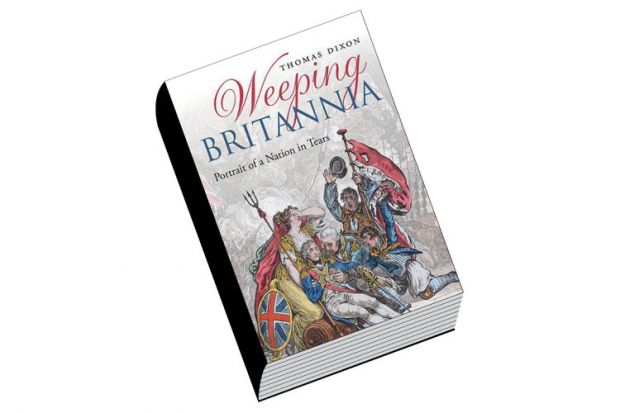When a book is endorsed by both Ian Hislop and Jo Brand, you know that you’re in for a bit of a ride. Historian Thomas Dixon takes us helter-skelter through a landscape of emotional Brits in a bid to disprove the apparent orthodoxy – a sort of Jeremy Clarkson view of today’s UK – that crying in public is an unfortunate and recent by-product of our multicultural, politically correct, post-imperial Britain. Public weeping has been disparaged as “emotional incontinence”: “Where is this, Argentina?” headlined Boris Johnson in The Daily Telegraph of the reaction to the death of Diana, Princess of Wales. And when the usually dour tennis star Andy Murray broke down after losing in the Wimbledon final in 2012, Toby Young of The Spectator asked if it was his “big girl’s blouse routine”.
These are just a few of the many delightful vignettes Dixon deploys to show that crying has gone in and out of fashion over the centuries, like flared trousers or big pants. His aim is to create “a portrait of a nation through a series of lachrymose miniatures” – 20 short chapters (or, for those of you of a more tolerant disposition, what he calls “twenty historical teardrops”). The result is a moving, tender and encyclopedic depiction of key events, individuals and texts that serve to illustrate Dixon’s theory that it was the Reformation, the French Revolution and the Empire that stifled the sob-fests.
The scientific jury is still out on what tears are; how and why humans (and elephants) produce them. But Dixon offers some lovely descriptions. Tears are formed “when our soggy sponge-like bodies are gripped then squeezed by a powerful set of ideas, often in narrative form”; they are, he argues, the only bodily fluids that are admired. He delights the reader with the views of others: Antony Sher’s observation, for instance, that tears are rather like sperm: “think about crying too much and it won’t flow”. Phyllis Greenacre, an eminent American psychoanalyst, believed crying to be a form of urination, since both were a “hydraulic release mechanism for tension and effect”, with women more prone to crying because of suppressed infantile penis envy. Sensibly, Dixon concludes that the metaphysical poet and cleric John Donne has never been bettered on the trinity of tears, emotion and humanity.
It’s hard to find fault with a cultural portrait of crying that takes in both the 15th-century mystic Margery Kempe and the Arthur Janov-inspired 1980s duo Tears for Fears. Nevertheless, there are hints here of the drawbacks involved in following in the wake (sorry) of satirical television programmes starring national comedy treasures that lampoon contemporary touchy-feely Britain (as Jo Brand achieved with For Crying Out Loud); and in bemoaning the drooping of the old “stiff upper”, deployed as a symbol of all that England once stood for – winning world wars, having an empire, and being able to use the word “gollywog”.
Did the publishers agree to a popular book on crying as long as Dixon was relentlessly upbeat, rather than depressing? Leaving a detailed discussion of death to the conclusion only compounds an unintended consequence: the fact that ordinary sadness, suffering and depression are overlooked. I’d like less Tears of a Clown and more Crying (Over You); a bit less Smokey and a bit more Roy. Not unconnectedly, there’s an over-reliance on elites and celebrities to represent Britannia (whatever that means); a reflection of our times and ourselves, perhaps. I’m less interested than this book is in George Osborne’s looking tearful at Margaret Thatcher’s funeral or Amanda Holden welling up on Britain’s Got Talent. The most revealing tears of genuine emotion in contemporary popular culture are found in the ITV series Long Lost Family. Damaged, hurt, broken-hearted people fold into grief each week. They offer the best portraits of what has made us cry since mankind first learned to hide his nuts in winter: separation, loss, hurt, regret, family and love.
Joanna Lewis is assistant professor in the department of international history, London School of Economics. She writes on the history of empire in Africa, masculinity and emotion.
Weeping Britannia: Portrait of a Nation in Tears
By Thomas Dixon
Oxford University Press, 456pp, £25.00
ISBN 9780199676057
Published 10 September 2015
POSTSCRIPT:
Print headline: Not with a bang but a whimper
Register to continue
Why register?
- Registration is free and only takes a moment
- Once registered, you can read 3 articles a month
- Sign up for our newsletter
Subscribe
Or subscribe for unlimited access to:
- Unlimited access to news, views, insights & reviews
- Digital editions
- Digital access to THE’s university and college rankings analysis
Already registered or a current subscriber?




